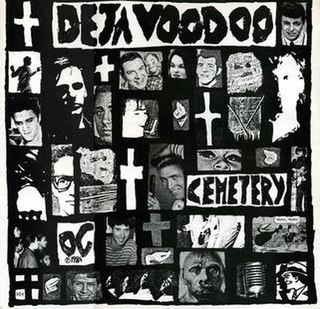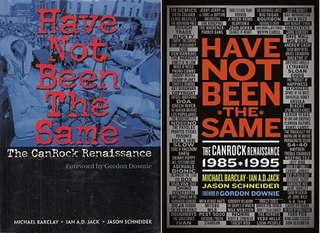Psychobilly is a rock music fusion genre that fuses elements of rockabilly and punk rock. It's been defined as "loud frantic rockabilly music", it has also been said that it "takes the traditional countrified rock style known as rockabilly, ramp[ing] up its speed to a sweaty pace, and combin[ing] it with punk rock and imagery lifted from horror films and late-night sci-fi schlock,... [creating a] gritty honky tonk punk rock."

Deadbolt is an American rock band from San Diego, California. Fusing rockabilly and surf music with tongue-in-cheek horror-themed lyrics, Deadbolt has called itself the "scariest band in the world", classifying their musical style as "voodoobilly".

Southern Culture on the Skids, also sometimes known as SCOTS, is an American rock band from Chapel Hill, North Carolina.

Cemetery is the first studio album by the Canadian garage rock band Deja Voodoo. The album was recorded in Studio Secret, save for the title track, which was recorded "in Bob's basement".

Og Music was a small but influential independent record label based in Montreal, Quebec, Canada.

The Stolen Minks are a three-piece Canadian garage punk band who have been praised as "Halifax's answer to The Gossip and The Detroit Cobras".

Too Cool to Live, Too Smart to Die is a mini-LP by the Canadian garage rock band Deja Voodoo, released by the American label Midnight Records in 1985. It was reissued in 1988 on the band's label, Og Music, with "dirt-floor mix" remastering, an additional song and a slightly different track list order.

Swamp of Love is the third studio album released by the Canadian garage rock band Deja Voodoo.

Big Pile of Mud is an LP release by the Canadian garage-rock band Deja Voodoo. It would be their last release recorded in a studio.

Framed in Blood – The Very Blessed of the 69 Eyes is a compilation album released by the Finnish rock band The 69 Eyes in 2003 through Gaga Goodies / Poko Rekords. It was released in the US on 29 August 2006 by Cleopatra Records. The album contains tracks from across the band's career, including both their glam metal- and gothic rock-styled works. Albums represented on the compilation run from "Savage Garden" to "Paris Kills".

The Worst of Deja Voodoo is a collection of singles, outtakes and oddities by the Canadian garage rock band Deja Voodoo.
Jerry Jerry and the Sons of Rhythm Orchestra is a Canadian alternative rock band whose musical style blends elements of surf music, gospel music, rockabilly, garage, and punk. The band also experimented with jazz on their third album Don't Mind If I Do.
It Came from Canada is a series of compilation albums, released on Og Music in the 1980s, which featured music by independent, alternative and punk bands from Canada.

Big John Bates is a Canadian singer, songwriter and guitarist. He cofounded and performed in Annihilator, Big John Bates & the Voodoo Dollz and the Noirchestra. Bates has had long-term sponsorships with Jagermeister, Gretsch (guitars) and Hofner (basses) through his career.
The Dik Van Dykes were a garage punk sextet based in Hamilton, Ontario, Canada who first formed in 1985 and folded in 1989.

Mark Sultan is a Canadian musician and entrepreneur from Montreal, Quebec. He was a member of a number of Canadian garage bands including the Spaceshits, Les Sexareenos, and Mind Controls. He has also spent time performing as a one-man band under the pseudonym BBQ, a moniker which has followed him beyond his solo career to his collaboration with former Spaceshits bandmate Blacksnake in the two-man band, The King Khan & BBQ Show. Mark Sultan usually performs using a number of aliases including Needles, Krebs, Von Needles, Skutch, Creepy, Bridge Mixture, Kib Husk, Noammnn Rummnyunn, Blortz, Celeb Prenup, and BBQ. In 2007 he released his first album as Mark Sultan entitled Sultanic Verses. In 2010, Sultan released $ as Mark Sultan and The Ding Dongs, the debut self-titled LP by Sultan and Bloodshot Bill.

Have Not Been the Same: The Can-Rock Renaissance 1985–1995 is a book by Canadian music journalists Michael Barclay, Ian A.D. Jack, and Jason Schneider, which chronicles the development of alternative rock in Canada between 1985 and 1995. Published by ECW Press, the book has appeared in two editions, an original in 2001 (ISBN 1-55022-475-1) and an updated tenth anniversary edition in 2011 (ISBN 978-1-55022-992-9). In conjunction with the 2011 edition of the book, two compilation albums of music from the era chronicled by the book were also released as fundraisers for charitable organizations.

Bacchus Archives is a record label that has often released previous unreleased recordings. Some of the recordings it has released, includes recordings by artists such as The Controllers, Evan "Funk" Davies, The Dils, Peter Miller and Bob Thompson. It is also sublabel of Dionysus Records.
Mark Davis is a Canadian singer-songwriter from Edmonton, Alberta. He is most noted for his 2011 album Eliminate the Toxins, which was a longlisted nominee for the 2012 Polaris Music Prize.














